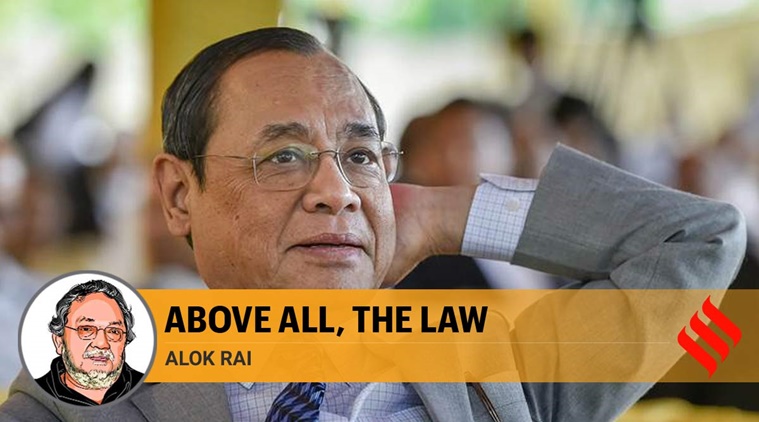The dignity of the Law is not a matter of concern merely to judges — though I believe it should be a matter of concern to them, too.
There are good reasons why institutions of the Law are sought to be protected from casual and random vilification. We are living in a time when all our institutions, even our very world, appears to have entered a process of accelerated decline. Despite the famous reassurance given by Krishna in the Bhagavad Gita — yada yada hi dharmasya… — a card-holding “sickular sepoy” like myself cannot help feeling that, in the absence of God or any credible representatives therefore, we all have a common interest in protecting the legitimacy of the Law and its institutions. The dignity of the Law is not a matter of concern merely to judges — though I believe it should be a matter of concern to them, too.
Hitherto, the law of contempt has been used primarily by judges in order to protect their fragile dignity, or to threaten others with their brief authority — as in the case of the judge who summarily sentenced a subordinate railway official on the station platform itself because he could not promptly provide the judge with last-minute accommodation — presumably by dislodging a legitimate traveller with a proper reservation. Similar examples, alas, abound.
It is time to recognise that judges are not the Law. They are — as indeed, we all are, except in the deepest personal matters — creatures of the Law. All of us, judges not excepted, exist under the Law, and not above it. It is in that sense that the Law, and the Law alone, that can be sovereign — doubly so in a country that describes itself as a constitutional republic. And all of us, judges and citizens — and, indeed, ex-judges — have a stake in maintaining the credibility and the legitimacy of the Law and its institutions.
But, perhaps, the time has come for the law of contempt to be invoked, not only by judges, but also against judges — and ex-judges — who endanger the dignity of the institution of the Law by their ill-considered words and actions.
After all, the law of contempt must find its raison d’etre in the need to protect the institution of the Law, and not merely the personnel — human, all too human — who man these institutions from time to time. And there appears to be no reason, prima facie, why the honourable judges — they are all honourable ex-officio, aren’t they? — should be considered exempt from, or above, the provisions of this, as of any other, law. It is, therefore, in the spirit of cooperative citizenship, of civic duty, and with deep humility, that I wish to suggest that judges — and ex-judges — should be considered liable for contempt against the sovereignty of the Law.
The legitimacy of the institutions of the Law is a complex business, and is not strictly reducible to being technically correct, as the lawyers springing to the defence of Ranjan Gogoi seem to think. Gandhi, after all, invented a whole style of politics on the basis of strategies — non-cooperation, satyagraha — whereby the vaunted legitimacy of the colonial state could be challenged. And we know the legitimacy of colonial law did not survive that contest, even though the post-colonial Indian state has seen fit to retain much of that “illegitimate” legal apparatus.
Law and morality are not the same thing — as Gandhi famously reminded Judge Broomfield. The domain of morality would lose something essential if it were to become a matter of legislation: Choosing freely, being free to choose both good or bad, is of the essence of moral being. But there is still a slippery relation between Law and morality. The Law and its institutions cannot afford to stray too far from commonly shared perceptions of morality. In point of fact, our courts have done commendable work in reminding the forgetful organs of the state that their legitimacy too derives not from the ever-serviceable forces of repression but from their being in some rough consonance with the moral sense of the people. Thus, it was the courts that, some years ago, reminded the state that there was something morally wrong in letting the people of the country die from starvation when the granaries were over-flowing, and the rats were dying from excess. I am aware that this “consonance” argument is problematic, particularly at a time when some people are arrogating to themselves the right to exclusive articulation of that “moral sense”. Also, when that “moral sense” speaks in plural voices, it is the Law, and the law, that must prevail. The khap panchayat of loud-mouthed “nationalists” cannot be allowed to trump the Constitution and the Law. But perhaps, in view of the chorus of condemnation that has ensued in the wake of Gogoi’s elevation, the Supreme Court needs to remember that its legitimacy too depends on some similar consonance?
The catalogue of Chief Justice Gogoi’s dubious judicial actions in his final phase is already alarmingly familiar. Not least, may I say, because it is all so recent: The blood on the floor isn’t quite dry yet, there are fingerprints that even our super-competent police can’t miss, and the footsteps, ah, the footsteps… To say that the institutions of the Law stand damaged and diminished seems an understatement. Gogoi’s personal choices are, well, personal. What concerns us is the larger question: Can the institutions of the Law seek to redeem their legitimacy by invoking the law of contempt? Indeed, with respect, contempt seems hardly sufficient. Try something stronger. Try disgust. Try repugnance. Try revulsion.
The writer taught in the department of English, Delhi University. This article first appeared in the March 26 print edition under the title ‘Above all, the Law’.
Source: Read Full Article




